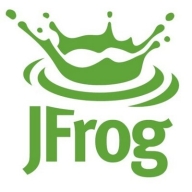

Oracle Cloud Infrastructure and JFrog Container Registry compete in the cloud and DevOps tools category. Based on features and integration with Oracle applications, OCI has a slight advantage for enterprise settings, while JFrog is preferred for DevOps due to its code scanning capabilities.
Features: OCI provides comprehensive solutions for enterprise database management with seamless Oracle application integration, cost-effective pricing models, and robust infrastructure performance. It offers support for modern and legacy systems, turnkey database solutions, and advanced cloud tools. JFrog Container Registry excels in code scanning, integrates well with development workflows, and suits multi-cloud deployments, catering more to agile DevOps environments.
Room for Improvement: OCI needs to enhance infrastructure interconnectivity, simplify setup processes, improve documentation, and expand its global data center presence and integration with other cloud providers. JFrog Container Registry should improve pricing transparency, offer advanced security features beyond basic vulnerability scans, and enhance data management controls and documentation.
Ease of Deployment and Customer Service: OCI offers flexible deployment models across public, private, and hybrid clouds but faces challenges in initial setups and inter-cloud connectivity. Its technical support feedback is mixed. JFrog Container Registry is deployed in public and hybrid cloud models, offering a smoother initial setup experience. Customer service rates at 7/10, indicating room for improvement in efficiency.
Pricing and ROI: OCI offers various pricing models such as pay-as-you-go, universal credits, and annual subscriptions, making it economical for larger enterprises with Oracle investments, though it can still be costly compared to AWS or Azure. It delivers ROI by reducing operational costs, especially through Kubernetes tools. JFrog Container Registry is considered pricey, with costs based on licenses and data usage. Despite high initial costs, users anticipate ROI as operations scale.
| Product | Market Share (%) |
|---|---|
| JFrog Container Registry | 29.7% |
| Oracle Cloud Infrastructure (OCI) | 1.2% |
| Other | 69.1% |


| Company Size | Count |
|---|---|
| Small Business | 33 |
| Midsize Enterprise | 20 |
| Large Enterprise | 53 |
The JFrog Container Registry is a repository manager, which supports Docker and Helm registries and Generic repositories, allowing you to build, deploy and manage your container images while providing powerful features with fine-grained permission control behind a sleek and easy-to-use UI.
Oracle Cloud Infrastructure offers autonomous database solutions, flexible scalability, and seamless application integration, backed by strong security features. Its competitive pricing and multi-tenancy capabilities provide significant value for enterprises needing comprehensive cloud infrastructure.
Oracle Cloud Infrastructure delivers robust database management, frequent updates, and advanced storage and network services. It boasts global pricing consistency and broad accessibility, making it a preferred choice for hosting databases and migrating on-premises applications. Users in diverse sectors rely on its ease of use, particularly in hosting applications and infrastructure management. However, OCI faces challenges in documentation and integration with third-party services and seeks improvement in automation, support responsiveness, and regional availability.
What are the key features of Oracle Cloud Infrastructure?OCI is utilized by companies in sectors like gaming, finance, and IoT for hosting databases and ERP systems. Its robust infrastructure supports high-performance computing and application development, making it a favorable option for integration and analytics tasks. Enterprises benefit from its capability to migrate on-premises systems to the cloud, enhancing their operational efficiency.
We monitor all Container Registry reviews to prevent fraudulent reviews and keep review quality high. We do not post reviews by company employees or direct competitors. We validate each review for authenticity via cross-reference with LinkedIn, and personal follow-up with the reviewer when necessary.